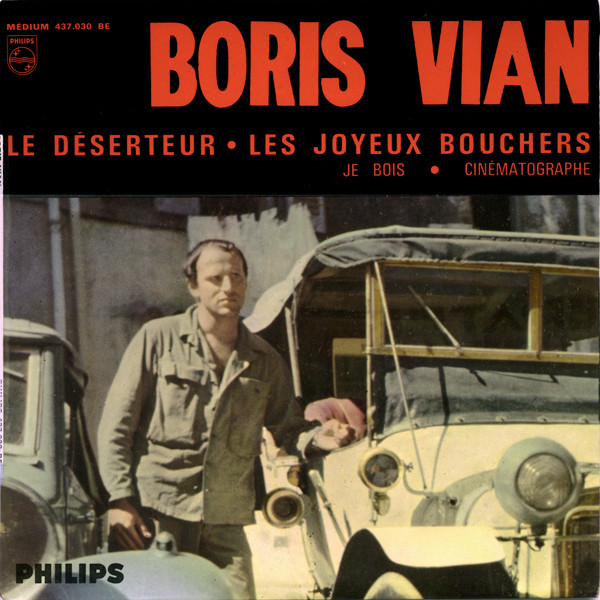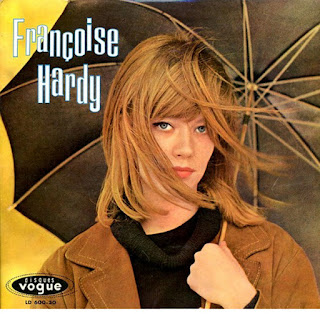An anti-war song for the ages...
7 May, 1954. The French military have just been humiliated by the Vietnamese in the battle of Dien Bien Phu and hopes of reconstituting the pre-war French empire in south eastern Asia have been vanquished along with the army. The government is in shock and the defeat hangs heavy over a country still piecing itself back together after the most calamitous of decades.
The very same day, Marcel Mouloudji, a rising chansonnier with a following among the intelligentsia congregating on the left bank in Paris generally known only by his surname, was giving a concert. Among the repertoire he chose to perform that day was a newly written song by poet, jazz musician and journalist, Boris Vian, who had been trying to get someone to perform it for some weeks, without success. At length, after Vian reworked the lyrics to adopt a more pacifist approach, Mouloudji agreed to sing it, and 'Le déserteur' received its first public airing in front of a shocked and stunned audience. A week later, he went into the studio and recorded it, releasing it on a 78 rpm record via the Philips label.
The lyrics on the record took the form of a letter written by a conscript to those "whom we call important" (Vian's original lyric was addressed to the president) announcing his refusal to be conscripted to fight and his intention instead to take flight. Recounting the horrors he had already known during the earlier war, the protagonist declared that he would tour the country, calling on his fellow citizens to refuse to fight, and with resigned indifference, closed the letter by saying that, if the soldiers came after him, well, he was unarmed and they could shoot him if they wished.
The pacifist intent behind the song, and the fatalism of the ending were profoundly shocking to a country still determined to believe that it had triumphed in a just war against the horrors of Nazism, and its release hard on the heels of the colonial disaster in Indochina compounded the insult. The record - together with all other performances of it - was instantly banned from the airwaves, although Mouloudji did sneak a live performance of it onto the airwaves in October. Deprived of airplay, the song nevertheless found an audience out on the road, becoming well known, if not exactly becoming a hit.
The song's author and co-composer, Boris Vian was responsible for hundreds of songs in his short career, although he himself would only record the ten songs that appeared on his 1956 album Chansons "possibles" et "impossibles". Among them could be found his own version of 'Le déserteur', this time with a more elaborate musical setting (and restoring the original opening line). Vian's album was not a best seller, and few at the time heard his take on the song, although as it has remained in print for several decades, it is likely as well known today as is Mouloudji's original recording.
Although not in any sense a major hit, the song's plaintive, lilting melody and evocative, thought-provoking lyric ensured it a longer-than-expected shelf-life. In 1956 it was picked up by Swedish lyricist Lars Forssell and reworked in that language as 'Jag står här på ett torg', in which guise it would be recorded firstly by Ulla Sjörblom and then by Lena Granhagen, while the version by Mouloudji continued to make small ripples around the world.
The song has been a rallying cry for the anti-war movement ever since. Joan Baez sang it many times at anti-Vietnam demonstrations (she would eventually release a version in 1980) and it has continued to be recorded, in a variety of languages, over the last fifty years. Among those who have committed it to tape are Italian singer Ornella Vanoni, French rock 'n' roller Eddy Mitchell, actor Michel Piccoli, Spanish singer Robo and Left Bank chanteuse Juliette Gréco but the most notable performance surely has to be that of Russian television producer Denis Kataev, who earlier this year, as the Russian army massed on the borders of Ukraine, recited the lyrics during the transmission of the Golden Eagle awards (the Russian version of the Oscars) before himself deserting the country. Nearly seventy years on from its creation, Boris Vian's lyrics for 'Le déserteur' still have the ability to shock, to provoke, and to make you think.








The last line sends a chill down my spine. Very moving and sadly topical.
ReplyDelete